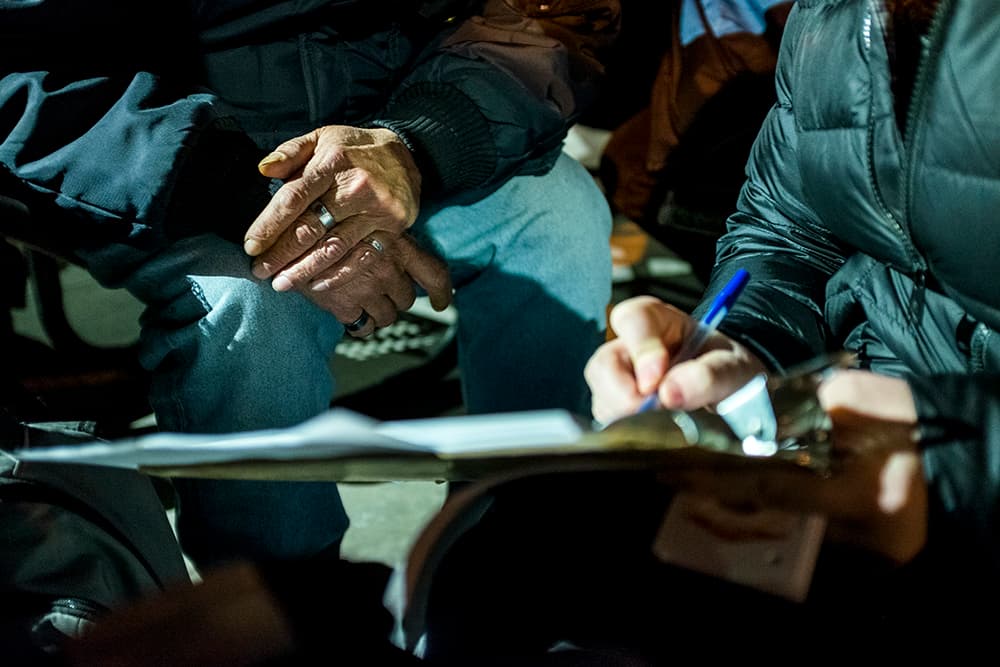Denver can end homelessness.
Matt Meyer, who took over last week as executive director of the Metro Denver Homeless Initiative, said he can be confident of that because of the compassion he sees in his community.
"What I see is a huge amount of commitment in our communities to addressing homelessness," added Meyer, whose MDHI has a key role connecting area service providers to federal dollars and nationally tested strategies.
Shelley McKittrick, who directs Aurora's Homelessness Program and is president of MDHI's board, said building community and political will to end homelessness takes "optimism. Stubborn optimism. And Matt has that."
McKittrick added that Meyer's candidacy to succeed Will Connelly was somewhat unexpected. Connelly -- "we loved him and were sorry to see him leave," McKittrick said -- had once been a homelessness street outreach worker. Meyer is a clinical psychologist who came to MDHI from Mental Health Partners, a Boulder-based nonprofit with a network of clinics.
McKittrick said Meyer will help broaden MDHI's perspective. And he brings an understanding of how the stress of homelessness can strain health, including mental health, "which is a huge component of our march to ending homelessness," she said.
Meyer said he has begun his work by studying places that have been able to declare they have ended homelessness, at least for certain people including veterans and those who have been without housing for long periods.
"My approach is very much to learn from other communities," he said. "I look at data. I like to see strategies that have been proven."
He's an advocate of housing first. That is already a guiding principle at MDHI, focusing on getting people into permanent housing, often with supports such as mental health, substance abuse or job counseling, without first requiring they prove, for example, they are drug-free.
Meyer is less sure of temporary approaches such as tiny homes, but says they may be an alternative as an interim step for people who shun traditional shelters.
"I don't think it's a scalable solution," Meyer said of tiny homes, "but it might meet the needs for a couple of dozen (people) who have very specific needs."
Before starting work as executive director, Meyer took part earlier this year in the annual point-in-time survey of homelessness in the Denver area that is coordinated by MDHI. He said he spoke to people during the count who he knows will be hard to reach because of their resistance to shelters, which can be chaotic and don't always accept pets or partners.
The U.S. Department of Housing and Urban Development requires that cities and towns receiving federal housing money conduct the point in time, which can highlight trends in homelessness. In addition to leading point in time for the region, MDHI helps local service providers keep abreast of best practices and secure federal grants for programs such as support for young people and families experiencing homelessness. Since MDHI was founded in 1994, the grants it has helped bring to metro Denver have totaled more than $100 million. Meyer said he would like to see MDHI seek more private funding and partnerships as well.
Meyer has been impressed by strategies close to home, including Denver's social impact bond, which takes an investment approach to addressing chronic homelessness. Funders that include the Denver Foundation and the Ben and Lucy Ana Walton Fund of the Walton Family provided a total of $8.6 million for the pilot administered by the Colorado Coalition for the Homeless and the Mental Health Center of Denver. Those service providers use police arrest data to identify some of the most vulnerable people experiencing homelessness, then help them find housing and provide them health, food, transportation, legal and other support.
The investors will get their money back and possibly more from the city if the program meets performance goals. The city expects to save money in the long run because the cost of arresting and jailing people who are chronically homeless is estimated to be higher than housing them.
"I think the impact bond has been a terrific success," Meyer said, saying he would like to see it expanded and other similarly creative approaches tried.
"We're not looking for a single solution. We're looking for a range of solutions" to allow Denver to respond quickly and build a durable system, Meyer said
Ending homelessness doesn't mean circumstances won't lead to people ending up on the streets, but that they don't stay their long. That requires a supply of affordable housing as well as resources to help people remain housed.
"When we get to that point, and we will get to that point, we'll have to shift resources," Meyer said, saying the goal then will be prevention.













